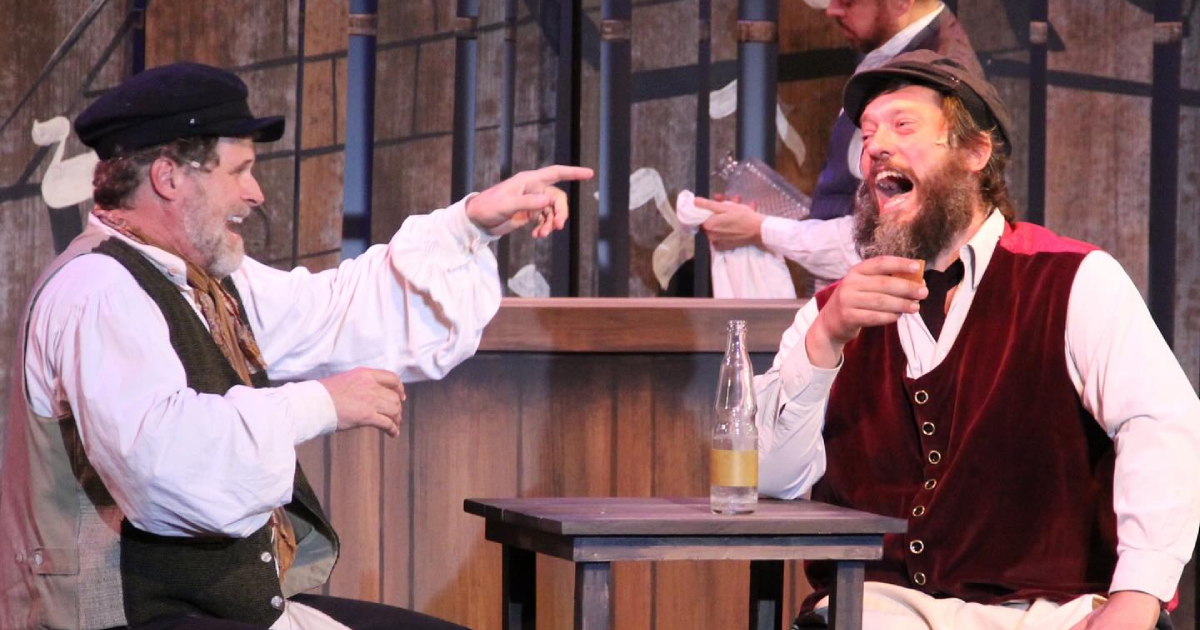“Fiddler on the Roof” made its stage debut in 1964, during the heyday of the American musical, and it’s both timeless and a product of its time.
The first mainstream quintessential Jewish tale that wasn’t a parody, it also offers a deeply universal family drama that focuses on a father trying to understand how his children are challenging tradition, the very thing upon which he’s built his life and comprehension of the world.
For these reasons among others, “Fiddler” is a classic, its charms undeniable. And it’s a marvelous first musical of The Barn Theatre’s 78th season, performed by an excellent cast and directed with terrific attention to detail by Eric Petersen.
Based on the Yiddish stories of Sholem Aleichem, the book by Joseph Stein is set in the last days of the fictional shtetl, Anatevka, in the Pale of Settlement. It’s Czarist Russia in 1905—on the cusp of revolution—and a poor milkman finds himself without a horse to haul his milk cart and three of five daughters of age to marry. He ruminates about money and morality directly to God and has a way of seeing things from all sides, much to the chagrin of his wife.
Tevye is very much the heart and soul of this show, here played beautifully by Robert Newman, a role he reprises from The Barn’s 2014 production. Both impish and resigned, he exudes warmth and compassion as well as very real exhaustion, frustration, and existential angst, but almost always with an abiding, gentle humor—with God, with his wife, with his daughters, and with their suitors.
Newman has often played opposite Barn leading lady Penelope Alex and together they have terrific chemistry. Here she plays his wife, Golde, with whom conversations are often loving, amusing, screaming matches. Her voice and force are strong, her range of emotion complex; their duet “Do You Love Me” is especially sweet.
It is at that moment in the show that Tevye declares “Love. It’s the new style.” One by one his daughters (Kasey Lazan, Violet Way, Dakota Moreno) eschew matchmaking and instead arrange their own marriages (suitors played by Charlie King, Brady J. Cunningham, Owen Squire Smith, and Luke Ragotzy), flying in the face of tradition. Tevye reasons with God in each case, ultimately bending to the wishes of his daughters until one proclaims her commitment to a gentile. “If I bend that far, I will break,” Tevye says, and with the breakdown of the family comes the breakdown of the community. All residents of Anatevka, forced by an edict of the Czar, must leave Russia with three days notice.
It reflects an historic period of dramatic social and political change through a personal lens that makes very real the sorrow and suffering of a people evicted and forced into exile—the unspoken subtext of which is the Holocaust to come.
That in itself is devastatingly powerful, but made more so—and beautiful—in the way the story is told: through a gorgeous and deeply resonant score we all know (even if we don’t realize we know the songs) with music by Jerry Bock and lyrics by Sheldon Harnick. Powerful music direction from Matt Shabala who leads a flawless live orchestra from the pit helps make extra vibrant memorable numbers such as “Tradition”, “If I Were a Rich Man”, and “Sunrise, Sunset”. Brady J. Cunningham’s “Miracle of Miracles” as Motel is especially lovely as well.
Choreography from Melissa Cotton Hunter (who also plays the matchmaker Yente) retains the spirit of Jerome Robbins’ original dances while adapting them for the skills of this company, most notably the wonderful bottle dance at the wedding scene and other wonderfully athletic group dances full of one-legged twirls, squats, jumps, stomps, claps and a cartwheel or two.
It’s a lively, full, visually-stunning stage. Brett Burradell’s set offers a suspended house frame taken apart piece by piece, symbolizing the dissolution of a way of life and the community, as well as part of the house’s exterior that when turned around reshapes the entire stage into the home’s interior, seamlessly. Alex Szczotka’s period costumes in muted colors shape character in terms of their roles and ages as well as the cultural signifiers such as the men’s prayer shawls that hang below their vests. Garrylee McCormick’s wigs are also well-designed and important cultural signifiers as are the props by Steven Lee Burright.
Meticulous sound from Troy Benton offers impressive balance and makes crisp and distinct high valence moments such as the playing from the fiddler on the roof (Jacob Ragotzy). And though scenes are largely well lit by Lighting Designer M. David Knewtson, the cyclorama is so brightly lit in bold neon colors, it’s at times a distraction from the otherwise muted tones on stage and can be hard to look at directly, especially during scene changes.
But this is a mere annoyance amid an otherwise magnificently-told, classic musical that though mournful, is largely joyful. The Barn Theatre’s production of “Fiddler on the Roof” does justice to this beloved, family-friendly tale and makes clear why, though it is very much of its time, it is enduring.
Fiddler on the Roof
The Barn Theatre
June 18-30
https://barntheatreschool.org/events/event/fiddler-on-the-roof/





